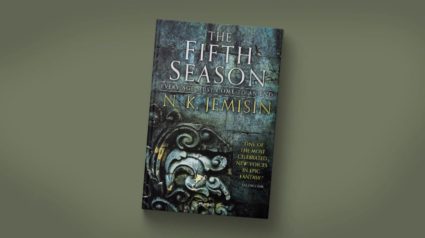Our June pick for the PBS NewsHour-New York Times book club is N.K. Jemisin's "The Fifth Season." Become a member of the Now Read This book club by joining our Facebook group, or by signing up to our newsletter. Learn more about the book club here.
Below are questions to help guide your discussions as you read the book over the next month. You can also submit your own questions for Jemisin on our Google form here. Jemisin will answer reader questions on the NewsHour broadcast at the end of the month. WARNING: Spoiler alert on questions further down.
Before reading, are you a fantasy fan? What are your perceptions about fantasy writing?
The prologue begins with the line: "Let's start with the end of the world, why don't we?" What do you think has caused this devastation?
Chapter One is told in the second person "you." Does this help you connect to the character of Essun?
What exactly is a "Fifth Season"?
How does Jemisin build the world the readers are in? Why do you think she chose to call the land "The Stillness"?
As you read, are you identifying most with Essun, Damaya or Syenite? Or a more minor character? Why?
Early on, the character of Hoa says "much of history is unwritten." Do you think that's true in our world as well?
Why do people in the Stillness fear orogenes? Do you see them as dangerous?
What parallels are you seeing between the fractured landscape and climate disasters in the book and our own planet?
How is the theme of oppression explored in the book? Is this oppression individual or structural? How does it resonate with our own world?
What is the meaning of the words "rogga" vs. "orogene"? Why do you think Jemisin chose to introduce both words to the reader?
Does Father Earth hate his human inhabitants? If so, why, and what's the meaning behind that?
What is the role of humor in this book? How would you describe Jemisin's authorial voice?
Do you find yourself using the glossaries at the back of the book? How does it help build out this world?
What do you think Jemisin is trying to say about power in this book? How do the Guardians fit into that?
Did the connectedness between the three main characters at the end surprise you? Why do you think Jemisin used this narrative device?
The dedication at the beginning of "The Fifth Season" is: "For all those who have to fight for the respect that everyone else is given without question." How does that resonate now that the book is over?
Support Canvas
Sustain our coverage of culture, arts and literature.

